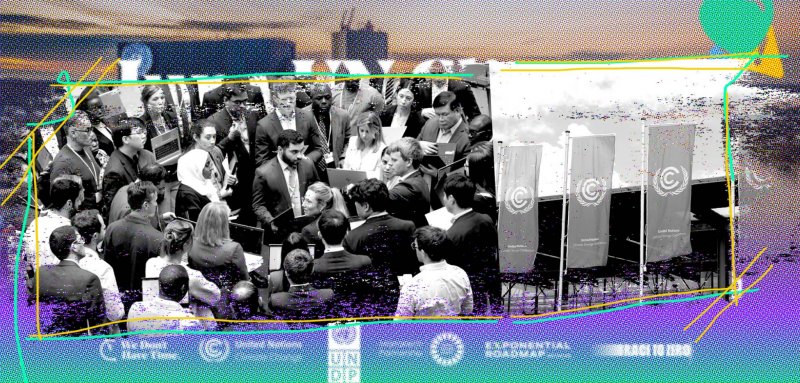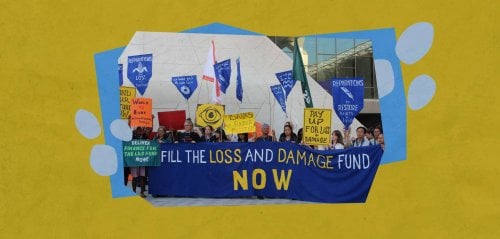As the world set a new historic heat record, averaging 1.6 degrees Celsius above pre-industrial levels for 12 consecutive months, more than 6,000 delegates gathered in Bonn for the mid-year United Nations climate talks. These annual talks focus on negotiating mechanisms for implementing agreements from the previous COP. The 2024 agenda centered on mitigation actions by 2030, particularly climate finance. However, the Bonn Climate Change Conference ended Thursday in a stalemate, with little to show for two weeks of discussions and a growing chasm between developed and developing countries.
The Bonn Climate Change Conference ended Thursday in a stalemate, with little to show for two weeks of discussions and a growing chasm between developed and developing countries.
“The hesitancy of developed actors to step up and fulfill their roles has been a major barrier to progress, keeping us locked in a cycle of inaction,” Campaigns Lead at Greenpeace MENA Shady Khalil told Raseef22. “This deadlock could carry over to the next COP, hindering meaningful advancements, unless there is a significant shift in financial commitments,” he said.
Negotiators failed to reach an agreement on the post-2025 finance goal, known as the New Collective Quantified Goal (NCQG), due to be set at COP29 in Baku, Azerbaijan next November. The NCQG will replace the yearly $100 billion that rich countries had pledged in climate finance 15 years ago.
Countries were divided on the size of climate global funding, and the responsibility for contributions. In February, U.N. climate chief Simon Stiell declared that $2.4 trillion per year was needed to keep the world's climate goals within reach.
While there is consensus that $100 billion is insufficient, developed countries did not propose an alternative figure. Developing nations suggested targets ranging from $1.1 trillion to $1.3 trillion.
One proposal came from the Arab Group and the G77+China, suggesting $1.1 trillion a year from 2025 to 2029. It proposed that rich countries raise about $440 billion annually through a 5% sales tax on defense, technology, and fashion companies, as well as a financial transaction tax. This portion should be in public grants, with the rest mobilized through private financing, including low-interest loans. The proposal pointed out that the goal is to target profitable, high-emission sectors such as the military or those that support "luxurious patterns of consumption" instead of those crucial for food and energy security in the Global South.
Saudi Arabia’s negotiator highlighted that military emissions of planet-heating gases account for 5% of global emissions. Climate Home News reported that “this surprised many observers”, as the Kingdom is ranked fourth worldwide in per capita spending on the military, sourcing a significant portion of its equipment from Western arms manufacturers.
But developed countries maintain that they cannot shoulder the new finance efforts on their own. They want China, the world's current biggest CO2 emitter and second biggest economy, and high wealth-per-capita Arab countries to contribute. The EU’s negotiator said the NCQG should be a “global effort”. Canada’s negotiator said it should come from a “broad set of contributors.” The U.S. proposes expanding the contributors base beyond what was set in the Paris Agreement.
The Arab countries and China reject this proposition. China's negotiator stated on Tuesday that “We, the developing countries, have no intention to make your number look good or be part of your responsibility, as we are doing all we can do to save the world".
Developed countries maintain that they cannot shoulder the new finance efforts on their own. They want China, the world's current biggest CO2 emitter and second biggest economy, and high wealth-per-capita Arab countries to contribute. The EU’s negotiator said the NCQG should be a “global effort”.
Khalil decried parties being “stuck in a loop” on expanding or protecting the definitions of “developed” and “developing” countries, while time goes by and people are hit hard by climate impacts. He stressed the need for developed countries “to set up in all ways to fulfill their moral and historical responsibility of finance”.
“We need to see numbers proposed on the table or they risk hindering ambition,” Khalil asserted.
Loss and Damage in Bonn
The Loss and Damage (L&D) Fund was another contentious issue in Bonn. Established at COP28, countries pledged close to $700 million to compensate developing nations for the destruction caused by the climate crisis.
On Tuesday, the World Bank’s board approved a plan for the bank to act as trustee and host of the secretariat for the L&D Fund for an interim period of four years. The Bank said that the fund's board will remain independent from the bank, determining “key priorities, including financing decisions, eligibility criteria, and risk management policies”.
The World Bank announced it will not play any role in fundraising, making funding allocation decisions, or the monitoring of projects financed by the L&D, expected to be operationalized over the coming months.
However, discussions on how to mobilize the necessary funds to address the rapidly increasing losses from extreme weather events and rising sea levels have not happened.
During the Bonn talks, developing countries and climate activists pushed for the fund to receive finance under in the NCQG. But developed countries resisted, arguing that there is no basis for this under the Paris Agreement, which stipulates providing financial resources for mitigation to reduce emissions and adaptation to climate impacts.
“Developing countries arrived with justified expectations of significant progress on financial commitments for mitigation, adaptation, and crucially, addressing loss and damage. Instead, they were confronted with resistance, neglect, and woefully insufficient offers from their developed counterparts,” Harjeet Singh, climate activist and Global Engagement Director for the Fossil Fuel Non-Proliferation Treaty Initiative, told Raseef22.
NDCs and Silence on the Fossil Fuels Front
Last year’s UNFCCC talks in Dubai secured the first-ever COP agreement to “transition away from fossil fuels”, the primary driver of the climate crisis. Yet, this subject received little attention in Bonn.
In his opening speech, the lead negotiator for Azerbaijan’s COP29 presidency Yalchin Rafiyev presented a plan of action for the November summit that did not mention fossil fuels. In fact, the incoming COP29 president Mukhtar Babayev told AFP in Bonn that his country would keep increasing fossil fuel production.
Developed countries wanted to discuss fossil fuels under the newly-created “UAE Dialogue” on implementing the outcomes of the Global Stocktake (GST). They also hold that the ‘mitigation work program’, established at COP26, is the appropriate platform for negotiating emission reduction strategies.
But the Like-Minded Group of Developing Countries (LMDCs), which includes China and Saudi Arabia, argued that the emphasis of the conference should solely be on finance and implementation methods.
“For decades, the fossil fuel industry has relentlessly engaged in spreading disinformation to stall climate action globally. These companies have demonstrated a consistent lack of genuine intention to reduce their emissions, while simultaneously exerting substantial influence over the pace and direction of climate negotiations, often in secretive collusion with policymakers,” Singh said.
Fossil fuel corporations “have misappropriated public funds through extensive subsidies, amassing enormous profits at the expense of the financial resources needed by developing countries for climate action,” he added.
Greenpeace’s Khalil said that the world has high expectations of the UAE, holding the current COP presidency, to protect the GST outcomes, especially regarding energy transition away from fossil fuels.
"We cannot afford to reach Baku with too much work still to do. So, please, make every hour here count," UN Climate Change Chief Simon Stiell had asked negotiators at the beginning of the two-week Bonn conference.
The UAE is also expected to set ambitious Nationally Determined Contributions (NDCs) to lead by example, particularly for oil and gas-producing countries, and set a benchmark for the world, Khalil said.
“The UAE must translate words into actions with ambitious and courageous NDCs that inspire others. These NDCs should lay out a roadmap for phasing out fossil fuels and accelerating renewable energy deployment in line with the 1.5°C target,” Khalil believes.
The UAE and Azerbaijan have committed to releasing "1.5-aligned" NDCs by early next year. However, they did not determine what it means for these voluntary national climate plans to be “1.5-aligned”, the limit for global average surface warming above pre-industrial temperatures.
In the six months since COP28, extreme weather has caused more than $41 billion in damage, a new report by Christian Aid revealed. Host country UAE, along with neighboring Oman, witnessed record flash floods in April, grounding hundreds of flights, destroying businesses and other property, and killing at least 20 people.
"We cannot afford to reach Baku with too much work still to do. So, please, make every hour here count," UN Climate Change Chief Simon Stiell had asked negotiators at the beginning of the two-week Bonn conference. His pleas seem to have fallen on lots of deaf ears.
Raseef22 is a not for profit entity. Our focus is on quality journalism. Every contribution to the NasRaseef membership goes directly towards journalism production. We stand independent, not accepting corporate sponsorships, sponsored content or political funding.
Support our mission to keep Raseef22 available to all readers by clicking here!
Interested in writing with us? Check our pitch process here!








